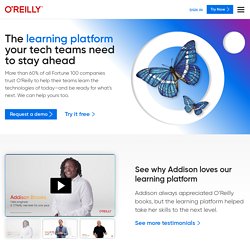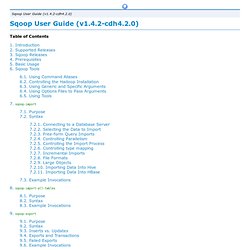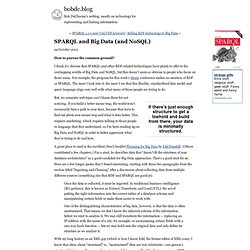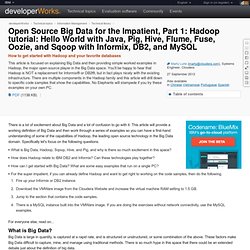

Learn Hadoop & Big Data with Free Courses Online. Stratasurvey. Info-tech-for-health. Datascience-transforming-healthcare. Python for Finance Hadoop For Dummies Data Science Toolkit. Data Science Starter Kit The Tools You Need to Get Started with Data From basic statistics to complex modeling and large-scale analytics, the Data Science Starter Kit outlines a clear path to mastering data and gets you started with essential tools, key algorithms and methods, and a survey of the hottest languages and frameworks in today's ecosystem.

If you're ready to plunge into the world of data, the Starter Kit provides the comprehensive introduction you're looking for. Buy any two titles and get the 3rd Free with discount code: OPC10 Or, get them all for $209.20 (60% savings) Data Science for Business: Written by renowned data science experts Foster Provost and Tom Fawcett, Data Science for Business introduces the fundamental principles of data science, and walks you through the "data-analytic thinking" necessary for extracting useful knowledge and business value from the data you collect. Ebook: $33.99 Ebook: $38.99. Sqoop User Guide (v1.4.2-cdh4.2.0) $ sqoop import (generic-args) (import-args) $ sqoop-import (generic-args) (import-args) While the Hadoop generic arguments must precede any import arguments, you can type the import arguments in any order with respect to one another.

Table 1. Common arguments 7.2.1. Connecting to a Database Server Sqoop is designed to import tables from a database into HDFS. . $ sqoop import --connect jdbc: This string will connect to a MySQL database named employees on the host database.example.com. You might need to authenticate against the database before you can access it. . $ sqoop import --connect jdbc: \ --username aaron --password 12345 Sqoop automatically supports several databases, including MySQL. You can use Sqoop with any other JDBC-compliant database. For example, to connect to a SQLServer database, first download the driver from microsoft.com and install it in your Sqoop lib path. SPARQL and Big Data (and NoSQL) I think it's obvious that SPARQL and other RDF-related technologies have plenty to offer to the overlapping worlds of Big Data and NoSQL, but this doesn't seem as obvious to people who focus on those areas.

For example, the program for this week's Strata conference makes no mention of RDF or SPARQL. The more I look into it, the more I see that this flexible, standardized data model and query language align very well with what many of those people are trying to do. If there's just enough structure to get a toehold and build from there, your data is minimally structured. But, we semantic web types can't blame them for not noticing. If you build a better mouse trap, the world won't necessarily beat a path to your door, because they have to find out about your mouse trap and what it does better.
A great place to start is the excellent (free!) Once the data is collected, it must be ingested. Another quote from Edd's book: Another quote on this topic: Amazon. Open Source Big Data for the Impatient, Part 1: Hadoop tutorial: Hello World with Java, Pig, Hive, Flume, Fuse, Oozie, and Sqoop with Informix, DB2, and MySQL. There is a lot of excitement about Big Data and a lot of confusion to go with it.

This article will provide a working definition of Big Data and then work through a series of examples so you can have a first-hand understanding of some of the capabilities of Hadoop, the leading open source technology in the Big Data domain. Specifically let's focus on the following questions. What is Big Data, Hadoop, Sqoop, Hive, and Pig, and why is there so much excitement in this space?
How does Hadoop relate to IBM DB2 and Informix? Can these technologies play together? For everyone else, read on... What is Big Data? Big Data is large in quantity, is captured at a rapid rate, and is structured or unstructured, or some combination of the above. Using Big Data technology is not restricted to large volumes. Big Data can be both structured and unstructured. Back to top Why all the excitement? There are many factors contributing to the hype around Big Data, including the following.
What is Hadoop? MADlib.